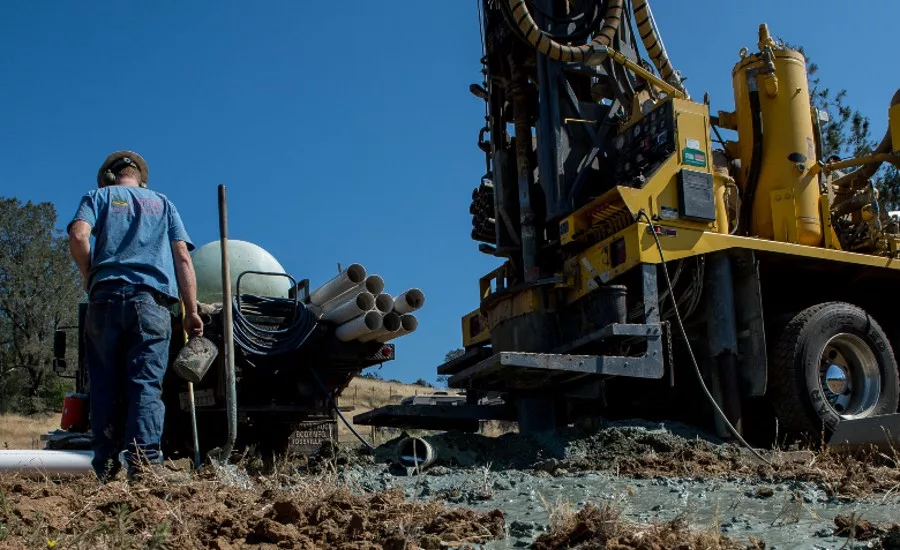Adapting to Innovations in the Water Well Industry
From Materials to Software, Contractors who Embrace Progress Thrive

From materials to risk mitigation, companies that embrace progress set the state for success.
Source: The California Department of Water Resources / The Driller file
Recently, our Ask Brock video series talked about embracing progress — new tech and methods — in the groundwater industry. That got us wondering about what contractors should think about now to succeed in the future.
Safety has led to many innovations in the water well industry and in drilling broadly. Think about safety cages around moving equipment. Remote controls, either on a hydraulic arm or untethered from the equipment, have grown more common. Companies that have not already embraced these types of risk reduction technologies may find themselves behind, particularly for larger, more complex (and more lucrative) contracts.
What comes next for safety? More technologies to mitigate risk, and keep hands and people away from pinch and nip points. Mines around the world have worked on perfecting fully remote rigs. That may not make sense for water installations, where a contractor may only install one well, as opposed to, for example, blasthole drilling. There will be innovations in water wells on the horizon, but even companies excited about progress have to weigh costs.
“As a manufacturer, you’re constantly looking at, how do we keep it cost-effective [enough] that somebody’s going to buy but trying to build as safe a product as possible,” consultant Tom Moffitt has said. Moffitt has served for years as sales and product line manager for a major rig manufacturer, giving him a front-row seat to rig evolution over 20-plus years in the industry.
“It’s a challenge,” he adds.
Moffitt’s point is sound. The business scale of water well industry companies often means slow adoption of the latest and greatest from similar, related industries. The value of the resources associated with mining or oil and gas often makes decisions about adopting new technology easier. As water’s value relative to other extracted resources changes, that changes too.
Which brings us to sustainability. To innovate — to really progress — companies need to think in terms of both environmental and business sustainability. High quality work lasts longer. What does it take to make sure that’s a 100-year well? Materials — from PVC to steel to pumps — matter, as does everything from development to proper sealing. What does it take to make sure your company is the one to service that well for its lifespan?
“If we don’t take time to focus on the financials that drive our businesses, we’re not going to be around here to be able to give those services to our customers,” says Jeff Williams, MGWC, CVCLD, former NGWA president, and vice president of Spafford & Sons Water Wells in Vermont. “We’re just not going to be here.”
Williams cites examples like cloud accounting software, which can let you approve invoices and do payroll from wherever you are. He’s spoken widely on business issues for contractors and often emphasizes technology-based solutions. Business, like well technology and methods, evolves.
“I think that financial sustainability is one of the things we overlook a lot of times,” Williams says. “There’s always a shinier object, right? There’s always something else more important.”
Finally, let’s not forget about the industry innovations that make the difference for end users. Solar powered pumps have helped many areas with no or unreliable electricity access groundwater — and sometimes make enough energy to sell back to the grid. Customers will start specifying smart metering and monitoring technologies to assess and better use available groundwater. We can order a stranger to come pick us up from the airport on our smartphones, why not use that mobile device to monitoring your well pump?
Well consultant and former driller Gary L. Hix, CWD/Pl, RG, CPG, owner of In2Wells LLC, leaves us with his advice.
“The market is ever-changing. … Listen to where the market is going and adapt your equipment, business, website to fit the needs of the market. Don’t be too big to fit all markets, but specialize in your niches. Ten years ago, we were writing about diversification because there was hardly any drilling going on. Today there is work, and I say specialize, be lean and mean, and go after the things in your expertise and maximize.”
Contractors who do that — who adapt well, embrace progress and innovate — won’t have to wonder about their business’ success in the future.
Looking for a reprint of this article?
From high-res PDFs to custom plaques, order your copy today!



